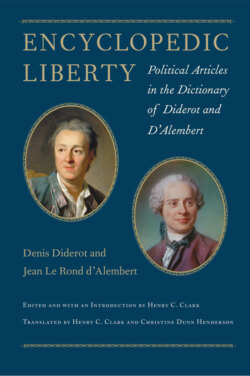Читать книгу Encyclopedic Liberty - Jean Le Rond d'Alembert - Страница 36
На сайте Литреса книга снята с продажи.
Оглавление[print edition page 119]
Natural Equality †
(Egalité Naturelle)
NATURAL EQUALITY (Natural law) is that which is found among all men solely by the constitution of their nature. This equality is the principle and foundation of liberty. Natural or moral equality is therefore based on the constitution of human nature common to all men, who are born, grow, live, and die in the same way.
Since human nature is the same in all men, it is clear according to natural law that each person must value and treat other people as so many individuals who are naturally equal to himself, that is to say, as men like himself.
Several consequences ensue from this principle of the natural equality of men. I shall rapidly examine the principal ones.
(1) It follows from this principle that all men are naturally free and that the faculty of reason could only make them dependent for their own welfare.
(2) That in spite of all the inequalities produced in the political government by the differences in station, by nobility, power, riches, etc., those who have risen the most above others must treat their inferiors as being naturally equal to them by avoiding any insults, by demanding nothing beyond what is required, and by demanding with humanity only what is unquestionably due.
(3) That whoever has not acquired a particular right, by virtue of which he can demand preferential treatment, must not claim more than others
[print edition page 120]
but, on the contrary, allow them to enjoy equally the same rights that he assumes for himself.
(4) That anything which is a universal right must be either universally enjoyed or alternately possessed, or divided into equal portions among those who have the same right, or allotted with equitable and regulated compensation; or finally if this is possible, the decision should be made by lot: a quite suitable expedient that removes any suspicion of contempt and partiality without diminishing in any way the esteem of those people not immediately favored. Finally, to go even further, I base on the incontestable principle of natural equality, as did the judicious Hooker,1 all the duties of charity, of humanity, and of justice which all men are obliged to practice toward one another, and it would not be difficult to demonstrate this.
The reader will derive other consequences that arise from the principle of the natural equality of men. I shall observe only that it is the violation of this principle that has established political and civil slavery. The result is that in the countries subject to arbitrary power, the princes, the courtiers, the principal ministers, those who control the finances, possess all the riches of the nation, while the rest of the citizens have only the necessaries of life, and the great majority of people groan in poverty.
Nevertheless let no one do me the injustice of supposing that with a sense of fanaticism I approve in a state that chimera, absolute equality, which could hardly give birth to an ideal republic. I am only speaking here of the natural equality of men.
I know too well the necessity of different ranks, grades, honors, distinctions, prerogatives, subordinations that must prevail in all governments. And I would even state that natural or moral equality are not contrary to this. In the state of nature men are truly born into equality but do not know how to remain so. Society forces them to lose it, and they only become equal again by laws. Aristotle relates that Phaleas of Chalcedon had imagined a way to equalize the fortunes of the republic: he would have the rich give dowries to the poor and not receive any in their turn, and the poor receive money for their daughters and not give any to others. “But,” as the
[print edition page 121]
author of the Spirit of Laws has observed, “has any republic ever accommodated itself to such a regulation? It places the citizens in conditions of such striking discrimination that they would hate even that equality that one would attempt to establish, and that would be foolish to try to introduce.”2 Article by Chevalier DE JAUCOURT.
